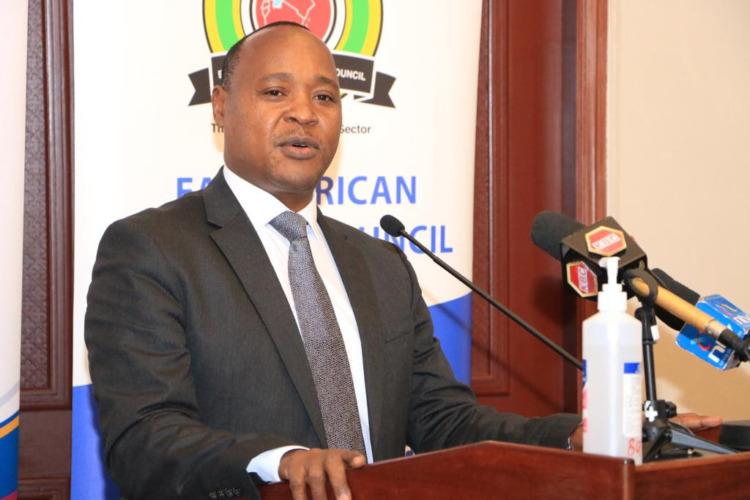Private sector players in the region have expressed optimism in making steps towards the recovery of Covid-19.
This follows a commitment by the East African Community Secretariat to prioritize strengthening public-private sector partnerships between the private sector in the region and the EAC Partner States governments, to jointly invest in vaccine manufacturing in the region.
The EAC Secretary-General, Dr Peter Mathuki said that there was a need for a coordinated approach in handling COVID-19 in the region and emphasized the need for local production of vaccines.
“EAC is working on strengthening partnerships between the private sector and EAC Partner States’ governments, to jointly establish an investment in vaccine manufacturing, to ensure the region can produce and avail vaccines to East Africans. Truck drivers transporting goods across the region should also be included among the priority groups who need to be vaccinated,” Dr Mathuki said.
Mathuki also noted that the EAC Secretariat is working on reviewing the Treaty for the establishment of the EAC.
The EAC Treaty entered into force on 7th July, 2020 following its ratification by the Republic of Kenya, the Republic of Uganda and the United Republic of Tanzania.
How East African businesses are going to lead the AFCTA
“There is a need for a comprehensive review of the Treaty and other legal instruments to reflect current EAC membership and provide mechanisms of resolving ongoing challenges. I am optimistic that there is a lot of goodwill around this, as this was also echoed by the President of the United Republic of Tanzania, Samia Suluhu, during the recent courtesy visit to by the EAC Secretariat,” Dr. Mathuki added.
The Secretary General further disclosed that the Community was working on developing a harmonized framework for a collective response by Partner States to COVID-19 in the region through the EABC and EAC Technical Working Group (TWG) launched last month.
He spoke during a CEO roundtable breakfast meeting organized by the East African Business Council (EABC), in Nairobi, Kenya.
On his part, Adan Mohamed, the Chairperson of the EAC Council of Ministers and Kenya’s Cabinet Secretary for EAC and Regional Development, reaffirmed his commitment to improving the business climate in all EAC Partner States through stronger Public-Private Dialogues (PPD).
“We are also currently in the process of building a Sh5 billion cross border market at the Kenya-Uganda border which is set to increase cross border trade,” said Mohamed.
Dr. Kevit Desai, Principal Secretary, State Department of EAC said that there was need for strengthened coordination on infrastructure spending to speed up development in the region.
EAC Secretariat saves Shs10b on travel expenses
The East African Legislative Assembly Speaker, Martin Ngoga, urged the business community to avoid getting entangled in national politics and form a unified front.
“We should always look at intra-EAC challenges not through geo- political lenses but through the eyes of the collective private sector,” Ngoga said.
The EAC Director General for Customs and Trade, Kenneth Bagamuhunda, said that the EAC was developing an e-Commerce strategy and a centralized platform for trade facilitation agencies in order to ease intra-EAC trade.
The meeting held under the theme ´Enhancing a Private Sector-led Integration & Emerging Opportunities in East Africa´ was attended by industry captains from the EABC, Kenya Private Sector Alliance (KEPSA) and the Kenya Association of Manufacturers (KAM).
EABC Chairman Nick Nesbitt said that the Private sector was in full support of the EAC Secretariat in its energized push of the comprehensive review of taxes in the region and adoption of the One Network Area to lower the cost of telecommunications.
The business community also asked the EAC Secretariat to urge EAC Partner States to push for elimination of Non-Tariff Barriers, harmonization of taxes and product standards in the region.
“Our deliberations today are set to improve the business and investment climate in the EAC in a bid to spur economic resilience, sustain jobs and revive cross border business operations,” EABC CEO Mr. John Bosco Kalisa said.
Dr. Mathuki was also accompanied by the Judge President of the East African Court of Justice, Justice Nestor Kayobera, and other EAC members of staff.
